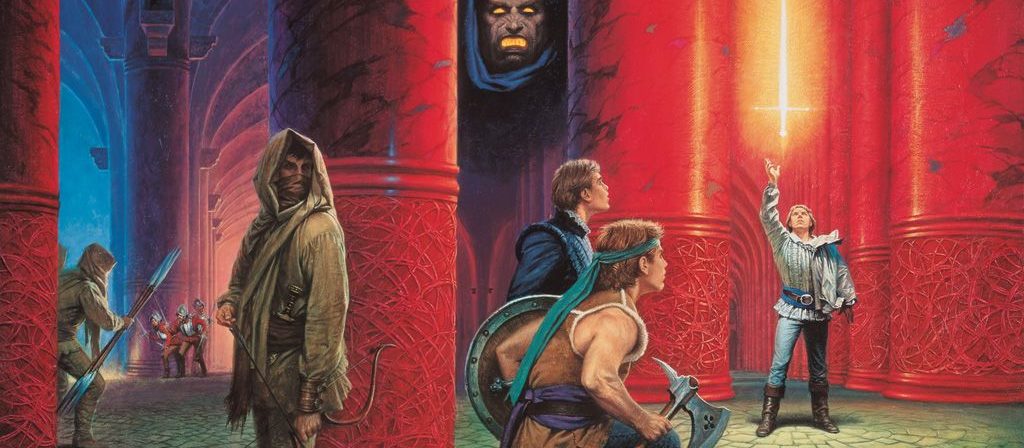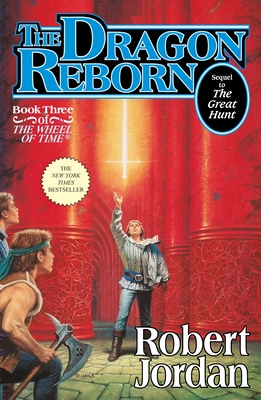

“Death comes to us all; we can only choose how to face it when it comes.”
The third book in Robert Jordan’s Wheel of Time series continues the stories of Mat, Perrin, Nynaeve, Egwene, Elayne, etc. though it largely neglects the titular Dragon Reborn, Rand al’Thor. It follows the same general structure of the first two books—strong opening, mostly pointless traveling and shenanigans for several hundred pages, and then a thrilling ending. It showcases Jordan’s strengths as well as his weaknesses as a writer. After three door-stopper novels, it feels like the story contained in them could have been edited down into one well-paced fantasy novel without losing any of its essence.
Despite ditching the series’ main character for most of the book, its middling middle portion was more engaging than that of either The Eye of the World or The Great Hunt. Although Jordan’s writing style can be tiresome, the actual story of The Dragon Reborn is more interesting and dramatic than those of its predecessors, as a few central threads are streamlined and given the bulk of the attention. We learn more of the Aes Sedai factions and the secretive Black Ajah group as Nynaeve, Elayne, and Egwene learn to harness their powers and get involved in a conspiracy. It’s mostly decent stuff concerning those characters, storywise. The plot of the girls’ secret mission is the most engaging of those presented in the book, and it also provides an avenue to explore some of the mythology of the series in a natural way (though Jordan still has a tendency to info dump).
Mat and Perrin fare less well with the material they are given. Mat, who spent most of the first two books as an annoyance, is healed from his evil dagger-induced sickness at the beginning of the book. Suddenly, he is an expert dueler, dispatching essentially anyone who comes against him in combat with a staff. He also realizes that he has an unnatural penchant for coming out on top in risky situations. He begins winning every game of dice and starts taking stupid gambles because he believes that his luck will allow him to prevail. There’s a throwaway scene in which Mat saves a woman’s life so she gives him fireworks out of gratitude, which he later uses to blow a hole in a castle wall. It’s not that he shouldn’t have blown a hole in the wall with fireworks, but that Jordan’s choice of how Mat got fireworks to do so was just silly. It also is borderline contemptible writing when Mat uses the fireworks as a distraction then immediately changes plans, entering the castle through the unexpected hole in the wall from the explosion, only to be surprised when guards come to the site of the explosion. Whatever. If Mat is to play a larger role in the following books (and I am told he is many reader’s favorite character, so I assume that to be true), it is necessary for him to be transformed into something other than what he was. That Jordan achieves this change sloppily deserves criticism, but hopefully going forward the lucky master of combat will be a more enjoyable character.
One of my main gripes with the series as a whole up to this point is that it is completely monotone. Characters will react with the same level of emotion to everything—the fiery emotional switch is either on or off. An awkward conversation with a member of the opposite sex,1 a dispute over the price of produce in the market, or getting attacked by Darkhounds; each draws the same level of reaction from the characters. I don’t have a very good sense of how much time has passed since the beginning of the series, but our main characters quickly went from farm boys that had never picked up weapons to killing indiscriminately and without much sign of remorse or moral conflict. It is incredibly jarring when you see, for instance, Mat’s heated internal monologue about games of dice, followed by him breaking a man’s back for cheating and then fleeing into the rainy streets with the thought: “Wet. My hair is dripping in my face.”
Likewise, Perrin’s story has a “tacked on” feel to it, as he tags along with Moiraine, Lan, and Loial as they follow Rand, who is secretly traveling to the Stone of Tear to prove himself. We are introduced to Zarine, a hunter of the Horn of Valere (which our protagonists already found and used in the last book), who pokes fun of Perrin the entire book, making his decision to rescue her in the dreamworld feel like an unearned attempt at an emotional payoff. Wouldn’t surprise me at all if they were an item in the next book, but their interactions so far have not come close to adequately developing a relationship between them, romantic or otherwise.
Though it seems that it’s one of the main ideas propping up the series’ universe, the predeterministic perspective can be very cheap in the way it is used. Many times, characters will “just know” things have occurred, or they will feel that something must happen because of some vague prophecy or vision (many of which are only brought up shortly before the time the thing must happen). The long-term foreshadowing is very shallow,2 and seems to be mostly contained within each novel with only a few overtly foreshadowed points remaining open. Many of the magical/mystical elements do not seem well planned. Powerful relics, well-known warrior clans, and locations on the map can become important out of nowhere. It could be the case that some of these things were casually mentioned previously, but there is so much other marginalia to plow through that a casual reference would have likely slipped past me. I feel like it bears repeating that had these three books been condensed into a single volume, it might have been a really good one.
While I appreciate the attempt at laying some groundwork for future books, it is hard to wade through Jordan’s endless list of names and places of no consequence. I stopped trying to keep track of the names of innkeepers, merchants, guards, etc. that the characters encounter, each of whom is usually given a first and last name. If I’m never going to read about the character again, just say “the innkeeper gave them rooms for the night.” If I need to remember their name, then they should interact with the main characters enough that it makes sense to learn it. On a positive note, there info-dumbs were slightly less frequent, and for that I am thankful.
Though it was more engaging than the first two books, it feels like not much of import occurred in The Dragon Reborn. Like I said earlier, it’s not that the story is bad—it’s not, I actually think the core story is probably good—it’s that it is unfocused and diluted, though this book does have a better pace than the first two. There are genuinely cool scenes to be found here, but they are weighed down by repetition, trivial details, lousy narrative setup, and the apparent need to have all of the main characters occupied with something even if their actions do not move the plot forward. It’s not awful, but it would be a stretch to call it anything more than just good. Despite my criticisms, I do think Jordan had a wonderful story lurking somewhere in his mind, he just doesn’t seem to have had the skill to write it into a story that works. It’s not possible to convey the story in one’s mind to the reader all at once; it must be written in some sequence and wrangled into form by the use of language. Jordan struggled to do those things at a high level, and his series suffers because of it.
1. I will refrain from any additional comment on the shallow quality of Jordan’s characterization of romantic relationships (at this point; I comment on it later).
2. For instance, there is a character called Min who “sees” the future in symbols. She tells Perrin that he will encounter “an Aielman in a cage. A Tuatha’an with a sword. A falcon and a hawk, perching on your shoulders. Both female, I think.” When he meets Zarine, she calls herself “Faile” which means falcon in an ancient language, and so we assume that she is the falcon from Min’s vision. Scratch that. We don’t assume, because Jordan spends plenty of words on Perrin’s internal thoughts about it.